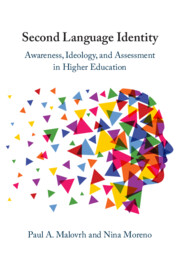Book contents
- Second Language Identity
- Second Language Identity
- Copyright page
- Dedication
- Contents
- Figures
- Tables
- Preface
- Acknowledgments
- 1 On Actors, Architecture, and L2 Advancedness in Higher Education
- Part I Advancedness and the L2 Learner
- Part II Variable Notions of Advancedness
- Part III Assessment, Identity, and Critical Language Awareness As Markers of Advancedness
- Book part
- Bibliography
- Name Index
- Subject Index
1 - On Actors, Architecture, and L2 Advancedness in Higher Education
Published online by Cambridge University Press: 27 July 2023
- Second Language Identity
- Second Language Identity
- Copyright page
- Dedication
- Contents
- Figures
- Tables
- Preface
- Acknowledgments
- 1 On Actors, Architecture, and L2 Advancedness in Higher Education
- Part I Advancedness and the L2 Learner
- Part II Variable Notions of Advancedness
- Part III Assessment, Identity, and Critical Language Awareness As Markers of Advancedness
- Book part
- Bibliography
- Name Index
- Subject Index
Summary
The present chapter provides an overview of the book by introducing its main tenet, advancedness, a term coined by Ortega and Brynes (2008), in the context of higher education. It also conceptualizes L2 learners as actors on a global stage, emphasizing the importance of their views of language use and of their own identity as L2 learners. It then provides an overview of the book. Through quantitative and qualitative analyses, Part I examines L2 Spanish learners’ beliefs about, and assessment of, advanced-level oral Spanish in social and cognitive contexts, and posits hypotheses about L2 learner identity. Part II taps into language ideologies of professionals working in the field of foreign/second languages in higher education. Quantitative and qualitative analyses yield individual as well as institutional biases about bilingualism and the “ideal” L2 speaker. Finally, Part III addresses assessment of advancedness through the lens of critical language awareness and L2 learner identity using mixed methodologies. The book’s last chapter presents conclusions based on the findings of its studies and makes a call to continue investigating advancedness from a sociocognitive perspective.
Keywords
Information
- Type
- Chapter
- Information
- Second Language IdentityAwareness, Ideology, and Assessment in Higher Education, pp. 1 - 10Publisher: Cambridge University PressPrint publication year: 2023
